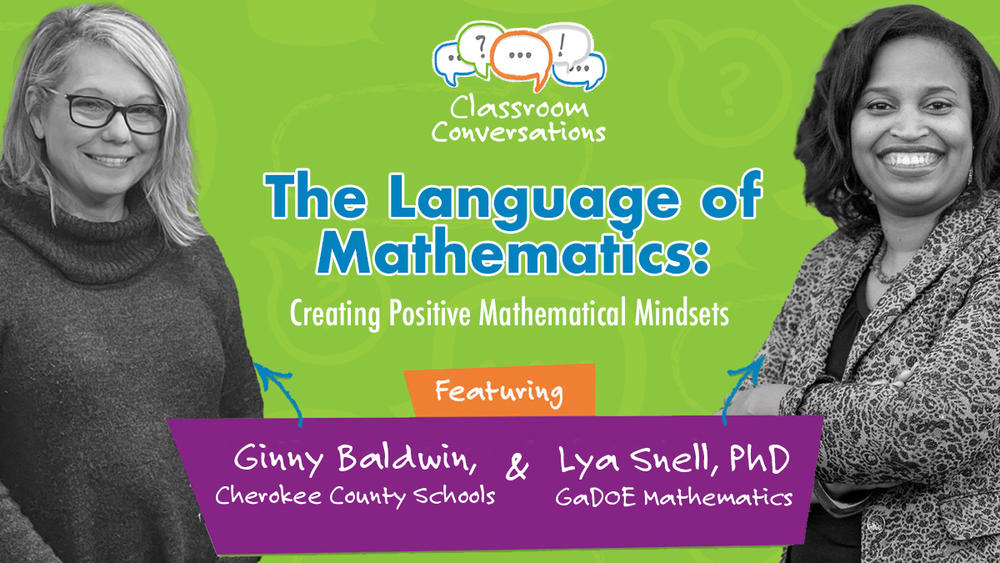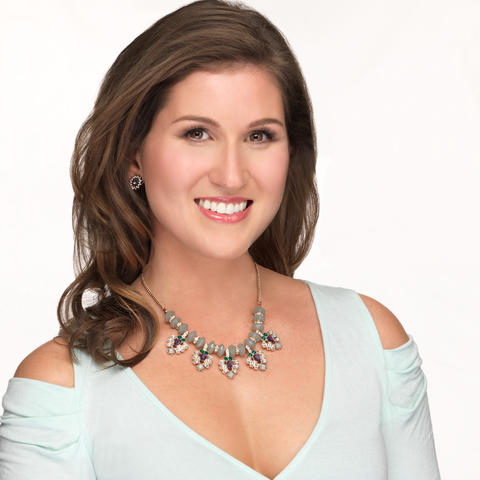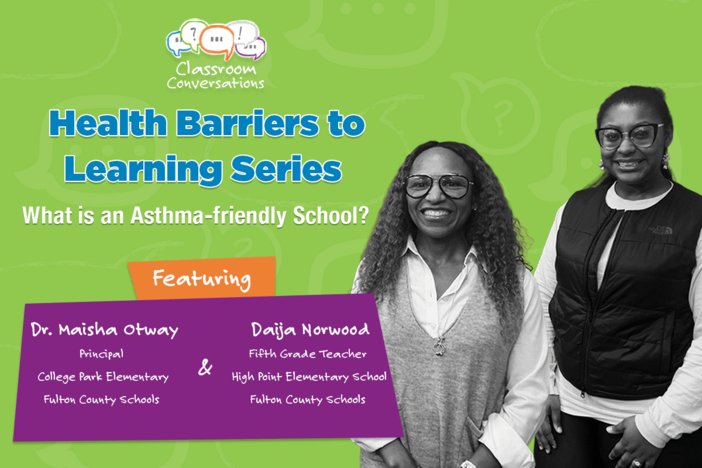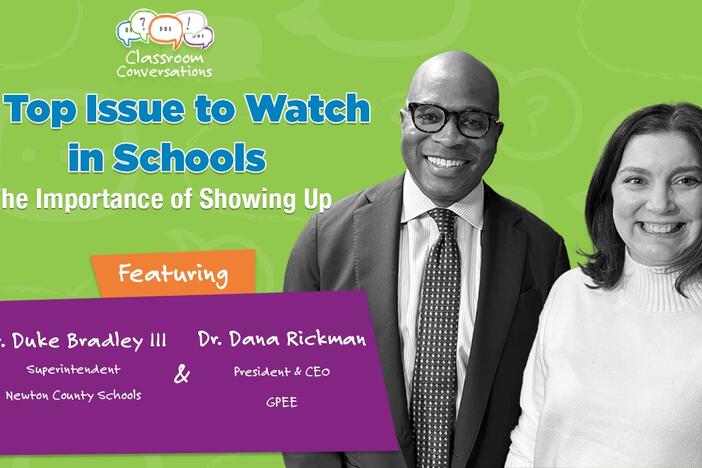
Section Branding
Header Content
Episode 317: The Language Of Mathematics: Creating Positive Mathematical Mindsets
Primary Content
Get the insider scoop on Georgia math standards for elementary level math! Join us in for this special episode of Classroom Conversations with Lya Snell of the Georgia Department of Education and Ginny Baldwin of Cherokee County Schools.

Get the insider scoop on Georgia math standards for elementary level math! Join us in for this special episode of Classroom Conversations with Lya Snell of the Georgia Department of Education and Ginny Baldwin of Cherokee County Schools.
TRANSCRIPT
Ashley Mengwasser: Good Day. Georgia Educators, Ashley Mengwasser here. Welcome to Classroom Conversations, the platform for Georgia's teachers. Thank you for joining us. The Classroom Conversations Podcast Series is presented by the Georgia Department of Education and Georgia Public Broadcasting. Can you believe we've made it to episode five? I have math teachers to thank for that count accuracy, by the way. Of course I'm shouting them out, because the mathematics standards revision and implementation process is the name of our game today. We are going to math so hard, I hope it's okay to use that as a verb you guys. Because this is the moment you've been waiting for as we lead up to the rollout of the new elementary math standards. Okay. If it's not the moment you've been waiting for, surely it's a moment you've been waiting for, right? To my left at GPB Studios, our guest Teacher as advertised on her Twitter bio, today's teacher feature is making math meaningful. I love the alliteration of that, but more importantly, the spirit of that. Ginny Baldwin is an EIP Teacher for grades K through 5 at RM Moore Elementary School, part of Cherokee County Schools. And she's been teaching for 30 years you guys. And to my right, Dr. Lya Snell, Mathematics Program Manager at the Georgia Department of Education. Ginny, Lya, welcome Math Magicians.
Ginny Baldwin: Thank you.
Lya Snell: Thank you. Glad to be here.
Ashley Mengwasser: How are you guys doing today?
Lya Snell: Doing well. Glad to be here.
Ginny Baldwin: Yes, doing very well.
Ashley Mengwasser: You look so chipper. Ginny, your EIP Reacher role. Can you tell us how you support students in that role? Tell us about that.
Ginny Baldwin: Yes. As a EIP teacher, I have the opportunity to work with students across all elementary grades, and I support students through small group targeted instruction, and I'm able to fill in learning gaps and excel student learning through hands-on interactive activities.
Ashley Mengwasser: Fill in the gaps. Where did you love of math come from? Are you one of those natural-born math whizzes, which I consider a superpower?
Ginny Baldwin: Unfortunately, I was not. My passion for math education happened by accident. My bachelor's degree was actually in Interior Design.
Ashley Mengwasser: What?
Ginny Baldwin: Yes. I've always had a passion for doing something that would allow me to be innovative and creative. I transformed designing floor plans into designing lesson plans and creating project boards to creating bulletin boards. And my passion for math evolved accidentally because there was a need for instructional resources to help students learn math conceptually without just simply following a list of rules and procedures, so I just dove head in and soon realized that how we teach math makes a world of difference in student success. And I was able to bring that passion of designing and being innovative into designing successful math lessons in the classroom.
Ashley Mengwasser: Not such a leap. Sounds like a smooth transition to me. I feel like she needs to come to our homes, Lya.
Lya Snell:
I agree.
Ashley Mengwasser:
And tell us what we're doing wrong. We can talk about that later, Ginny. Lya, I need some stats on you as well ma'am. I know you've been in the game for 21 years. How did you get into Mathematics Program Management for the Georgia DOE?
Lya Snell:
I had an amazing calculus teacher in high school, and my high school calculus teacher helped me see the beauty of the subject. And everything that I learned prior came together during that class. And at the university level, I majored in chemical engineering and mathematics with a minor in computer science. But then after doing an internship, I realized I didn't want to study batteries for the rest of my life.
Ashley Mengwasser: What?
Lya Snell: So, I became a math teacher. And that has been the most rewarding experience for me. I've taken that into leadership at the district office and leadership at the state level. And so I'm just super excited about helping all learners and helping everyone be excited about learning mathematics.
Ashley Mengwasser: A mission to help and leadership that brought you here today, which we're grateful for. Okay team, our objective is clarity, illumination, maybe even epiphany for our listeners as we understand the standards business. So Lya, when will these new standards roll out?
Lya Snell: Yes. We had several teachers from all across the State of Georgia come together to make recommendations regarding what should be learned at each grade level and in each high school course. This was the largest involvement of teachers and stakeholders in the history of mathematics standards review. We had over 400 teachers come together, thousands of constituents from across the state, and they all came together to decide what expectations were best for learners at each grade level and course. We're excited because the new standards will be implemented in fall of 2023 with professional learning happening in 2021, 22 school year, and preparation also 2022, 23 school year. And during that time, the Georgia Department of Education is working with teachers to develop resources, instructional support materials that can be implemented in the classroom when the new standards are implemented.
Ashley Mengwasser: Got it. Okay. Well, to approach our interview today by the numbers, I've got about eight questions for you. You delved into a little bit there, Lya, in terms of how this sausage was made. Tell us a little bit more about the actual process and the development of the standards. And then we'll have Ginny talk about the role for teachers that you were just teasing for us.
Lya Snell: Yes. We had several committees come together to review the standards and to make decisions about what should be taught at each grade level in each classroom in each high school course as well. And that included citizens. We had a citizens review committee, and it also included an academic review committee that can included university professors and professionals, technical college readiness professionals, as well as leaders at the district office, leaders at schools, and then also amazing teachers. Georgia has some of the best teachers in the world.
Ashley Mengwasser: I believe it. Woo woo.
Lya Snell: And the mathematics teachers are even more special.
Ashley Mengwasser: What are the odds?
Lya Snell: We were able to pull over 400 teachers together and thousands of constituents to review the standards, to provide feedback on surveys, but also to come in a room together and decide what should be learned in each grade level.
Ashley Mengwasser: That's cool. I think it's cool to just be in a room of like-minded professionals anyway. But you said there were about 400 teachers involved?
Lya Snell: Yes.
Ashley Mengwasser: And Ginny was one of them.
Lya Snell: Yes, she was.
Ashley Mengwasser: What was your role, Ginny?
Ginny Baldwin: As Lya mentioned, I had the opportunity to work on the revision team, and the most exciting part was collaborating with teachers and educators from around the state. I worked mostly with the third grade revision team to analyze the current standards. And after receiving feedback from community stakeholders and leaders, we then listened to their suggestions and made the standards even better. And during the work sessions, the other thing that was great to do is, we planned vertical meetings across all K through 12. And so we broke apart from our third grade team and met with others, just to make sure that the learning was a natural progression from grade-to-grade.
Ashley Mengwasser: That makes sense. That makes a lot of logical sense. Well, in terms of just meeting these standards and getting to know them personality wise to help teachers understand the change, what do you think is the biggest difference between the new standards and the old ones, Lya?
Lya Snell: One of the biggest differences is the focus on reasoning. All of our big ideas in every grade level and every high school course, kindergarten through 12th grade, actually literally has the word reasoning in the big idea. The goal with the new standards is for students to actually understand what they're doing, understand the mathematics, and have high levels of comprehension. Because mathematics is an amazing subject with lots of beauty. And their interconnectedness of the mathematics allows for students to see the natural connections and makes sense of the language of mathematics. With the new standards being implemented, there are several instructional resources that the Georgia Department of Education has provided within the actual standards documents. The new standards have progressions, and this is the first time ever that we've had progressions. Progressions that show how the standards are taught from kindergarten all the way through high school levels. Additionally, there is a focus on age appropriateness, also guardrails for teachers to see what is taught and how far the content extends in each grade level. Additionally, within the standards document, there is a focus on the fundamentals in the early grades, so helping to establish a strong foundation of fundamental concepts in mathematics, so that students are prepared for secondary level mathematics when they matriculate there. Additionally, it allows for students to think flexibly about the mathematics, and students can solve problems any way they see fit. It provides more context and information within the standards document about the standard algorithm and how the standard algorithm can be utilized by students rooted in place value, reasoning and understanding, and any other method that the students understand. With the progressions, the age appropriateness, and the flexibility with strategies that students are engaged in, the idea is that there will be higher levels of comprehension of the mathematics content.
Ashley Mengwasser: That's interesting. What do you want all teachers to know about mathematics teaching and learning for students?
Lya Snell: As we implement the mathematics standards, let's make mathematics fun. Mathematics is a beautiful subject with a lot of interconnectedness. And in order for students to see that interconnectedness, they have to be presented with tasks that allow for them to think and reason, and also engage in the mathematics in a way that they get excited about the learning experience.
Ashley Mengwasser: Let's make it fun. Let's clear the smoke and make it fun. What do you want teachers to know, Ginny?
Ginny Baldwin: I agree with Lya, that math definitely should be fun. And I feel like one of the biggest misconceptions about math instruction is that, we're just looking for that final correct answer to the problem instead of really thinking about the instruction itself. Math is much more than just getting an answer and simply regurgitating steps and procedures to reach an answer. And so there are a lot of students who can memorize rules and procedures to get that answer, but then they don't really understand how to conceptualize that or-
Ashley Mengwasser: The why?
Ginny Baldwin: Yes. And learn how did they get that answer and how will they ever use that in a real world authentic situation. To me, I just want others to realize that math is fun and math instruction should be about the process and connections more than just a final answer.
Ashley Mengwasser: Right. The conceptual understanding as you're describing it. And all of these new standards anyway, are just the evolution of math standards are only geared towards student success. Remind us how an open to mathematics and a positive growth focused mindset aids student success, Lya?
Lya Snell: Mathematical mindsets is so important. As teachers are engaging with helping students master the mathematics standards, being positive and having positive language and thought around mathematics teaching and learning is important. Mathematical mindsets are also critical for the home, so having parents that are engaging with their learners at home, having a positive mindset around mathematics. And mathematical mindsets in the classroom are also important for students to be successful. We encourage teachers to form a partnership with parents, so they can also enjoy the experience of learning mathematics with their students and know exactly what their children are learning in the classroom. As teachers are focused on having positive mathematical mindsets, that carries over to students, and then it also carries over to the home with parents and guardians.
Ashley Mengwasser: What do you say to that?
Ginny Baldwin: And I agree. And I think that one of the first steps in creating positive mathematical mindsets begins with the teachers in the classrooms and helping students realize that they can do rigorous math task. And one of my favorite quotes from a student says, "My teacher thought I was smarter than I was. So I was." And so I feel that teaching mathematics is about encouraging productive struggle and helping students make connections so that the math makes sense. And there's no such thing as a math person or a non-math person, I hear that all the time.
Ashley Mengwasser: I love that.
Ginny Baldwin: I'm not a math person. But we all have the potential to learn math at a high level if given the time to go through the steps.
Lya Snell: Yes.
Ashley Mengwasser: Because it's teachable?
Ginny Baldwin: Yes.
Ashley Mengwasser: Which is why we're all here. We're going to implement the new math standards, and there's going to be a need for support along the way for a bunch of different groups, so let's start with the first one. What resources are available to help teachers implement the new math standards at the highest level for students, Lya?
Lya Snell: We are again, excited about a project where we have resource revision and development underway. Soon after the State Board adopted the new standards, we immediately began the process of drafting resources that teachers will be able to use in the classroom to implement the new standards. We have videos in partnership with Georgia Public Broadcasting. We're excited about those.
Ashley Mengwasser: Woo whoop.
Lya Snell: We also have curriculum resources being developed by our amazing teachers throughout the state on resource revision and development teams. Ginny, again, is leading one of those teams.
Ashley Mengwasser: Ginny, so many rules.
Lya Snell: Yeah. Awesome teachers like Ginny are coming together and teacher leaders as well, coming together to provide resources for teachers to implement the standards.
Ashley Mengwasser: Ginny, what resources are you looking forward to support teachers?
Ginny Baldwin: I think one of the most exciting things about these learning plans that we are in the process of developing, is that they include multiple sections for engaging, students exploring and allowing students to then apply what they've learned. There's also resources for student support and enrichment that are going to be a big part of each project. And the other thing that's exciting about the new resources, is that they're going to be available in platforms to reach all learners, whether they're synchronous, asynchronous, or offline. So matter what your learning situation is at the moment, there's going to be a way to reach those students. And then the other thing that I'm excited about, with just the new standards and the things that are being offered are the math concessions and other virtual learning specialist sessions that are going to be held throughout the year to help teachers implement the new standards.
Ashley Mengwasser: Sounds like good support to me. And what about for our parents who are supporting their kids' mathematics learning from home, what resources are available to parents, Ginny?
Ginny Baldwin: Well, in the frameworks that we're creating, there is a section on every single learning plan that says, "Engaging families," with links and resources that they can do to extend the learning at home. But I think the most important things that parents can do to support math learning, is just to help their children see math and the activities that they do every day. Let students measure ingredients when you're cooking to learn about fractions or count things, estimate, when you go to this store, calculate how much money it's going to cost or how much change you should get back, or when you're cooking, instead of just putting the timer say, "What time do we need to get the food out of the oven?" And just letting students be involved in the math that occurs every single day in authentic situations.
Ashley Mengwasser: Daily life.
Ginny Baldwin: Yeah.
Lya Snell: Yes. We call that mathematizing. So mathematizing their world. And when you've been bit by the math bug, there is no cure.
Ashley Mengwasser: If Lya, is evidence.
Lya Snell: So, mathematize their world. Some of the resources we have for parents include a video series called Make Mathematics Count, Georgia, that we are providing in partnership with Georgia Public Broadcasting as well.
Ashley Mengwasser: Love the title, by the way.
Lya Snell: Yes.
Ashley Mengwasser: Great.
Lya Snell: Make Mathematics Count, Georgia Series includes some of our local celebrities, where we have Georgia faces that the parents may also see on television.
Ashley Mengwasser: Can you name a few?
Lya Snell: Such as Jeff Foxworthy is one to name, for example. And so they're just talking about how they use mathematics in their fields and also telling parents how important it is for their children to learn mathematics at the highest levels. We're excited about those videos. They also include specifics about what their children will be learning at each grade level, so we have those kindergarten through high school. We also have, embedded within the standards document, we've made the standards themselves, also parent friendly. We have evidence of student learning that's incorporated for each learning objective or expectation at each grade level. Additionally, we have a progression that shows what's being taught at each grade level, so that their parent can see how the concepts are progressing from year-to-year as students are matriculating through elementary, middle, and high school.
Ashley Mengwasser: All of these treasures. Let's look at the classroom itself, Ginny, I want to hear about some of your teaching experiences. Are there any math success stories you can share with us that relate to using mathematics standards in your classroom?
Ginny Baldwin: Well, one thing that came to mind occurred actually when instructions suddenly stopped and became digital in the spring of 2020.
Ashley Mengwasser: Oh, I wonder why.
Ginny Baldwin: But we didn't let that from stopping us from having successes. What we did was provided choice boards. The third grade team was working on perimeter and area, so we wanted to keep the students engaged, and we wanted the students to be able to still engage with each other and not just listen to a recording or sit in a digital classroom, so we made this choice board where students could use tools from around their house. They designed pens for their dogs and talked about the perimeter and area.
Ashley Mengwasser: I love that.
Ginny Baldwin: Yeah. Using tools such as pencils or pretzels. They also sent pictures and often videotaped themselves doing that and explaining it. That was fun. And the students were able to see what others were doing, even though they weren't in the same classroom. Students also participated in some productive struggle and argumentative type questions, like, "Would you rather have a bedroom of a perimeter of something or something else?" And they defended the reasoning.
Ashley Mengwasser: Defend the reasoning. I love that.
Ginny Baldwin: And then there was even fun activities, where they could design a chicken coop or something else and with a certain defined area and see if the perimeter changed as their designs changed. That was just something I felt like it was a success, because we were able to use the standards and task at a high quality, even though we weren't with the students in person. But I feel like the most successful things that occur in the classroom are when students are eager to engage without hesitation or fear of making a mistake. And so I just want to instill that in the students. And so I feel like when I feel successful, when mistakes, conversation and perseverance are valued over being fast or getting the answer first. And I love that when students have that aha moment and they see that making connections after they've made mistakes, they learn from those mistakes and they then begin to truly understand the concept.
Ashley Mengwasser: That's why you do what you do, right?
Ginny Baldwin: Yeah.
Ashley Mengwasser: It gives you that goosebumps feeling.
Ginny Baldwin: Yes. It's very rewarding.
Ashley Mengwasser: It is. Is warm, fuzzy. As always, on Classroom Conversations, we want to inspire our teachers in the classroom. Ginny, you've got to tell us more. 30 years of wisdom on your end, can you give us one of your hot Ginny teaching tips?
Ginny Baldwin: Yes. Well, one thing that has stuck with me over the years, it's been many years, was an educator once stated, or it was an administrator once stated, "Education is not a glass ball. It won't break if you drop it." And what she meant by that was, if a lesson fails, you can bounce back. It's not the end of the world. You can go into the classroom, fix that, what didn't go right and tweak things and then have better success the next day.
Ashley Mengwasser: That's beautiful. What do you think about that, Lya?
Lya Snell: I love it. And it goes back to the growth mindset, but growth mindset for teachers. So failure is not always a bad thing, you can learn from your mistakes as long as you're learning.
Ashley Mengwasser: Making those attempts.
Lya Snell: Yes, absolutely.
Ashley Mengwasser: So, kind of where the beauty comes in.
Lya Snell: Yes.
Ashley Mengwasser: How about some instructional strategies that have worked for you, Ginny? We love to give our audience a few things that they can just walk away with and implement immediately.
Ginny Baldwin: I think one of the biggest norms and main go-to instructional strategies that I implement is just making math visual and hands on. And as Lya mentioned, fun. We want learning to be a mixture of concrete, representational, and abstract models so that students can make connections and understand the math, so that they can then apply it. And so that to me is one of the most important instructional strategies that we implement. I also feel that it's important to allow and encourage students to use a solution path that makes sense to them. Students do not all think the same or see things the same way, just as we as adults don't always see things the same way.
Ashley Mengwasser: That's true.
Ginny Baldwin: And so, some strategies may be more efficient or faster than others, but that's not the part of the learning process that we should focus on. And as students share how they've solved the problem, they begin to make connections, especially as students get up and say, "I solved it this way," and another student can then share, and then they can see how those two different strategies work together and students learn from each other and then grow as a math student.
Ashley Mengwasser: What do you mean by solution paths?
Ginny Baldwin: Someone may want to draw out problems or break it apart, or if there's... I just recently did something with fractions, and it was actually a fraction division problem. They didn't really realize it was a fraction division problem. But some students drew pictures, some students used numbers, and so they all came up with a different strategy to solve the problem. And they were all successful.
Ashley Mengwasser: Their own method, but to reach the same answer.
Ginny Baldwin: There's just not one way to get there.
Lya Snell: Yes.
Ashley Mengwasser: And you allow that?
Ginny Baldwin: Yes. It's important. Yes.
Lya Snell: Yes. Flexibility and thinking is allowable in the mathematics classroom, absolutely.
Ashley Mengwasser: It is?
Lya Snell: Yes.
Ashley Mengwasser: I'm mind blown right now. This is beautiful. Anything else you ladies want to add?
Lya Snell: Well, I just want to mention that we have multiple solution paths for students to engage in to understand the mathematics concept that they're presented with. The new standards really focus on flexibility and thinking and flexibility as it relates to the solution paths that students will have the opportunity to demonstrate. It's not just one right way, there are multiple ways, but students have the flexibility to use the method that makes sense for them. Also, teachers have resources available for every unit and every grade level at georgiastandards.org. With that, all of the current resources are being refreshed to align to the new standards, but those resources are available to use right now in the classroom.
Ashley Mengwasser: That's amazing. Plenty of stuff available to be the wind beneath our teacher's wings. And we have some time. We have plenty of time to ramp up with this and get adjusted.
Lya Snell: Absolutely.
Ashley Mengwasser: Any advice for teachers that may be nervous about the new standards, Ginny? What do you say?
Ginny Baldwin: I would just say that a lot of the content is going to be consistent. It's not going to be just a totally... There may be things that have adjusted from grade-to-grade, but students still need to learn fractions, they still need to tell time, they still need to add, they still need to know place value, so those things are going to be consistent. The standards may put a new twist on it and a focus that's a little bit different-
Ashley Mengwasser: Because it's better for the students.
Ginny Baldwin: Yes. But it's not just something brand new that they've never seen before.
Lya Snell: And we want students to understand, so ensuring that we do all that we can to support them and focus in on that reasoning, comprehension, and understanding for the students.
Ashley Mengwasser: Thank you for being here, both of you. Really appreciate it. We hope you've enjoyed this episode. We'll be back next Monday with something equally good for your ears. And there's more math coming your way soon, because later in the series, we'll have Dr. Snell back with a secondary math teacher. If that doesn't add up, well, I don't know what does. One final sendoff, you're a great teacher. Catch you next week.
Get the insider scoop on Georgia math standards for elementary level math! Join us in for this special episode of Classroom Conversations with Lya Snell of the Georgia Department of Education and Ginny Baldwin of Cherokee County Schools.







